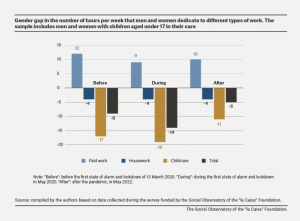Gender gap in household duties has been reduced after the Covid-19 pandemic
 The study “Gender inequality in paid and unpaid work after the pandemic” co-authored by our researcher Lídia Farré and Libertad González for “laCaixa” Foundation reveals that the COVID-19 pandemic has had significant effects on gender equality, particularly in terms of women’s employment and domestic responsibilities.
The study “Gender inequality in paid and unpaid work after the pandemic” co-authored by our researcher Lídia Farré and Libertad González for “laCaixa” Foundation reveals that the COVID-19 pandemic has had significant effects on gender equality, particularly in terms of women’s employment and domestic responsibilities.
The closure of businesses and schools during the pandemic led to a significant increase in unpaid work for women, with men’s involvement in childcare remaining low. However, a recent study conducted in Spain has shown that two years after the first lockdown, the gender gap in total weekly working hours, including paid and unpaid work, has narrowed.
This reduction is mainly due to men’s increased involvement in childcare during the pandemic, resulting in a more equal sharing of tasks within the household. While women still dedicate more time to unpaid work and childcare, the study suggests that men’s increased participation in childcare during lockdown could contribute to a more equal distribution of family responsibilities in the long term.
Recent news
- Four researchers of the UB School of Economics are listed in the 2% of the world’s most influential scientists
- The second edition of the UB School of Economics Young Researchers Meeting highlighted the excellence of the research done in the field of Economics at the UB
- How the adoption of robots has influenced global sourcing activities among Spanish manufacturing firms
- A Closer Look at the MSc in Economics Class of 2025
- Call for expressions of interest for Assistant Professor positions
- A recent UB study analyzes the environmental and economic impact of flight ticket taxes in Europe
- Would you like to join us for a coffee with researchers from the Faculty?
- UB School of Economics is recruiting two tenure-elegible lecturers
- Call for expressions of interest: PhD Fellowships in Economics

Sorry, the comment form is closed at this time.